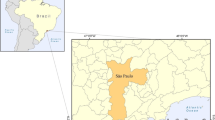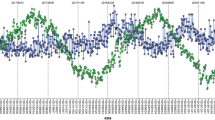Abstract
Several studies worldwide have demonstrated significant relationships between meteorological parameters and stroke events. However, authors often reported discordant effects of both barometric pressure and air temperature on stroke occurrence. The present study investigated whether there was an association between weather parameters (barometric pressure and temperature) and ischemic stroke hospitalization. The aim of the study was to find out whether daily barometric pressure may be used as a prognostic variable to evaluate the workload change of a neurological intensive care unit. We conducted a retrospective review study in which we collected the independent (barometric pressure and temperature) and dependent variables (stroke hospitalization) every 24 h for the periods 10/1/2016–4/30/2017 at Augusta University Medical Center of Augusta, GA. We analyzed the data with zero-inflated Poisson model to assess the relationship between the barometric pressure, temperature, and daily stroke hospitalization. The results showed that there was a significantly correlation between daily barometric pressure variation and daily stroke hospitalization, especially on elder male patients (≥ 65). Stroke events were more likely to occur in the patients with risk factors than in those without risk factors when exposed to barometric pressure and temperature changes. Decreased barometric pressure and increased temperature were associated with increased daily stroke hospitalization. Furthermore, there was a potential delayed effect of increased stroke events after cold temperature exposure. Barometric pressure and temperature changes over the preceding 24 h are associated with daily stroke hospitalization. These findings may enhance our understanding of relationship between stroke and weather and maybe used in the development of public health strategies to minimize the weather-related stroke risk.



Similar content being viewed by others
References
Benjamin EJ, Salim S, et al. Heart disease and stroke statistics—2018 update: a report from the American Heart Association. Circulation. 2018;137:e67–e492.
Lim JS, Kwon HM, Kim SE. Effects of temperature and pressure on acute stroke incidence assessed using a Korean nationwide insurance database. J Stroke. 2017;19(3):295–303.
Marabito M, Crisci A, Vallorani R. Innovative approaches helpful to enhance knowledge on weather-related stroke events over a wide geographical area and a large population. Stroke. 2011;42:593–600.
Masatoshi M, Shizukiyo I, Eiji K. Cumulative effects of weather on stroke incidence: a multi-community cohort study in Japan. J Epidemiol. 2010;20(2):136–42.
Han MH, Yi HJ, Kim YS. Effect of seasonal and monthly variation in weather and air pollution factors on stroke incidence in Seoul, Korea. Stroke. 2015;46:927–35.
Houck PD, Lethen JE, Riggs MW, Gantt DS, Dehmer GJ. Relation of atmospheric pressure changes and the occurrences of acute myocardial infarction and stroke. Am J Cardiol. 2005;96:45–51.
Shaposhnikov D, Revich B, Gurfinkel Y, Naumova E. The influence of meteorological and geomagnetic factors on acute myocardial infarction and brain stroke in Moscow, Russia. Int J Biometeorol. 2014;58:799–808.
Jimenez-Conde J, Ois A, Gomis M, Rodriguez-Campello A, Cuadrado-Godia E, Subirana I, et al. Weather as a trigger of stroke. Daily meteorological factors and incidence of stroke subtypes. Cerebrovasc Dis. 2008;26(4):348–54.
Dawson J, Weir C, Wright F, et al. Associations between meteorological variables and acute stroke hospital admissions in the west of Scotland. Acta Neurol Scand. 2008;117(2):85–9.
Wang X, Cao YJ, Hong DQ, Zheng D, Richtering S, Sandset E, et al. Ambient temperature and stroke occurrence: a systematic review and meta-analysis. Int J Environ Res Public Health. 2016;13(7):698–710.
Lim Y, Lim H, Hong Y, et al. Variation in mortality of ischemic and hemorrhagic stroke in relation to high temperature. Int J Biometerol. 2013;57:145–53.
Low RB, Bielory L, Qureshi AI, Dunn V, Stuhlmiller DFE, Dickey DA. The relationship of stroke admission to recent weather, airborne allergens, air pollution, season, upper respiratory infection, and asthma incidence, September 11, 2011 and day of the week. Stroke. 2006;37:951–7.
Diaz J, Garcia R, Lopez C, et al. Mortality impact of extreme winter temperature. Int J Biometerol. 2005;49:179–83.
Correia M, Silva MR, Matos I, Magalhaes R, Lopes JC, Ferro JM, et al. Prospective community-based study of stroke in Northern Portugal: incidence and case fatality in rural and urban population. Stroke. 2004;35:2048–53.
Gunes H, Kandis H, Saritas A, Dikici S, Buyukkaya R. The relationship between ischemic stroke and weather conditions in Duzce, Turkey. World J Emerg Med. 2015;6:207–11.
Acknowledgements
We thank Dr. Santu Ghosh for statistical analysis. We also thank Joy Hayman for IRB application and patient recruitment.
Author information
Authors and Affiliations
Corresponding author
Ethics declarations
Conflict of Interest
The authors declare that they have no conflict of interest.
Ethical Approval
All procedures performed in studies involving human participants were in accordance with the ethical standards of the institutional and/or national research committee and with the 1964 Helsinki declaration and its later amendments or comparable ethical standards.
Informed Consent
Since this study was a retrospective study, informed consent was not required.
Rights and permissions
About this article
Cite this article
Guan, W., Clay, S.J., Sloan, G.J. et al. Effects of Barometric Pressure and Temperature on Acute Ischemic Stroke Hospitalization in Augusta, GA. Transl. Stroke Res. 10, 259–264 (2019). https://doi.org/10.1007/s12975-018-0640-0
Received:
Revised:
Accepted:
Published:
Issue Date:
DOI: https://doi.org/10.1007/s12975-018-0640-0




